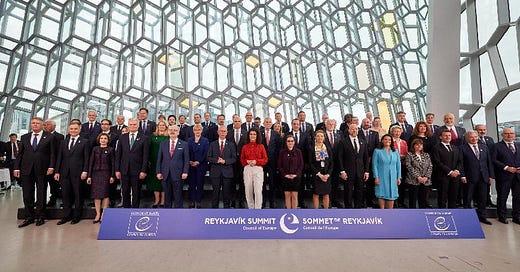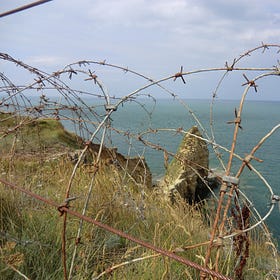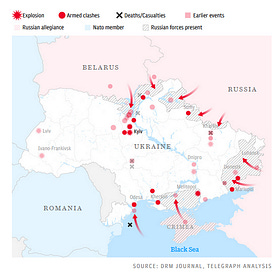Europe: 'We Must Defend Our Values' and 'Win a Just Peace'
Council of Europe vows to hold Russia accountable and keep supporting Ukraine during summit
This week, leaders and representatives from Europe came together in Reykjavik, Iceland, under the umbrella of the ‘Council of Europe’, the organisation that forms the cornerstone of Europe’s human rights protections, to discuss the war in Ukraine as well as the role of the council in safeguarding human rights across the continent. One of the main decisions made was to establish a ‘register of damage’ to document damage caused by Russia, “as a first step towards an international compensation mechanism”. Other decisions relate to strengthening the Council’s role in safeguarding “human rights, democracy, and the rule of law”. In this article, I will take a look at why this council was held and take you through the most important events.
‘High’lights
The historic (not my words) summit started off with the European anthem, which in case you did not know, is a variation on Beethoven’s Ode to Joy, of which, I kid you not, there are even official hip-hop and techno versions (check out all versions here, and if you want to watch some of the speeches yourself, do it with the anthem in the background, to get that truly ‘historic’ feel).
After Iceland’s Prime Minister gave her opening speech laying out the summit’s goals, Ukraine president Zelenskyy joined the opening session through a video feed. He thanked Europe for giving him the means to shoot down “100 percent” of Russian missiles, asked for more weapons, fighter jets, and help to build an air defence system that can bring Ukraine to “100 percent” victory, since it is the “only realistic peace plan” that will lead to “100 percent justice”. He also called for a tribunal to bring “those who brought terror” to justice. I am assuming that the repetition of that ‘100 percent’ is a form of rhetorical flourish, but I nevertheless have this ingrained tendency to take anyone who claims to do a 100 percent of anything with a grain of salt. Maybe that’s just me.
There was also the strange speech made by British PM Boris Johnson Liss Truss Rishi Sunak, who went on an entire tangent about stopping migrants, which he ended with the slogan “stop the boats!” Yet what I found much more bizarre was E.U. Commission President Ursula von der Leyen urging “all of us to rally behind” the “Ukrainian peace formula”, which seems to mean sending them weapons, fighter jets, and whatever else they might have on their wish list, like more NATO special forces, until ...? That is the part that no one says out loud, of course.
A short history of the Council of Europe
Since its foundation in 1949, the Council of Europe has only met three times before, so this fourth meeting of Heads of State and Government of its 46 European member states should be seen as significant. It is important to note that this council is separate from the 27-member European Union, and can therefore in many ways be seen as representing the European continent as a whole. After World War 2 ended, European leaders wanted to prevent a repetition of the horrific conflicts that had brought European life and culture to near-total destruction. “Convinced that the pursuit of peace based upon justice and international co-operation is vital for the preservation of human society and civilisation,” they formed the Council of Europe, to “achieve a greater unity between its members” who pledged to respect the “principles of the rule of law” as well as “human rights and fundamental freedoms”. All Council of Europe member states have also signed up for the European Convention on Human Rights, which aims to protect human rights, democracy, and the rule of law. What is impressive about these agreements and institutions is that they have for the most part accomplished that which for more than a thousand years seemed a utopian fantasy, namely to prevent wars between European nations. They have done this through international agreements as well as through institutions like the European Court of Human Rights, which through its binding judgements strives to ensure that the human rights of 700 million Europeans are protected. Not that membership is an automatic guarantee that human rights are safeguarded. I am reminded of the purging of political opponents and activists that took place inside Turkey in 2016 after a failed coup attempt, and there are plenty of other examples of human rights violations in other European countries as well. More on that later.



Understandably, especially when considering this history, the Council is worried about the war that has been raging on the continent since February last year. In a way, this is the culmination of decades of friction between Russia and the other Council members. Ever since the country joined in 1996, the European Court of Human Rights has ruled against Russia for violations during its wars with Chechnya, laws against homosexuality, and the prosecution of political opponents. After Russia invaded Ukraine, it was expelled (or more accurately, Russia withdrew before it was expelled) from the organisation, for violating the Council’s Statute. On 15 March 2022, the Parliamentary Assembly, in which hundreds of members of parliament from the Council’s member states participate, unanimously condemned the “Russian Federation’s aggression against Ukraine” and stated that the country poses “a blatant menace to security in Europe”, citing previous acts of “Russian military aggression” against other countries. Such agreement is rare, even more so when we are talking about representatives from dozens of countries, and speaks to the fundamental split that this war has created between Russia and Europe.
It was always hoped that Russia’s membership would lead to democratic and human rights reforms inside the country, and those same future hopes were expressed during this fourth Council summit by German Prime Minister Olaf Schulz, who said that the door should be kept open for a “democratic and peaceful future”, “however unlikely it may seem today”. Whether that is hopeful optimism or naive idealism, I’ll leave up to you to decide.
The aims of the summit
As I mentioned at the beginning, one aim of this week’s summit was to support Ukraine. This is why a register of damages has been set up by many of the countries that participated. It remains unclear how exactly the Council wants to get Russia to pay for these damages, as far as I could find offering nothing besides vague allusions to ‘international mechanisms’, or in some cases ‘reparations’ and ‘tribunals’. This sounds a lot like concessions one would extract from a peace deal, which in the current situation already seems unlikely without ‘bringing those who brought terror to justice’. To me, this language betrays an underlying assumption of a Ukrainian ‘victory’ in which the West gets to make the demands. Because of how critical some kind of victory in this war is to the Russian government, these kinds of assumptions are a dangerous fantasy, whose continued existence brings us ever closer to nuclear war.
How any of these measures, from damage registers to international arrest warrants, are supposed to lead to peace, no one seems to say, but last month’s leaked Pentagon documents showed that the U.S. does not expect Ukraine to gain a decisive advantage any time soon. In other words, the plan seems to be to just keep going and hope to at some future time gain an advantage on the battlefield, which means more death, more destruction, and of course more profits for the global arms industry, while everywhere people are struggling to get by. And keep hoping that Putin is just bluffing when he talks about nuclear weapons, just like he was bluffing when he warned about a war in Ukraine if NATO remained unwilling to give security guarantees. That ‘peace’ ‘plan’ is 100 percent insane.
The second main aim of the Council meeting was to put a stop to “democratic backsliding” across the continent, like
increasing violence, surveillance, and intimidation against journalists.
Notable examples that I need to mention are the murder of Maltese investigative journalist Daphne Caruana Galizia, as well as the over a decade-long detention and psychological torture of Wikileaks founder and journalist Julian Assange, and Ukraine passing a bill that “imperils press freedom in the country by tightening government control over information,” but there are plenty of others.laws restricting activism and the right to demonstrate.
Again, there are plenty of examples. The United Kingdom has arrested dozens of people during the crowning of King Charles III under the Public Order Act 2023, which prohibits common protester tactics like obstructing traffic or attaching yourself to people or objects, and gives police the “powers to stop and search without suspicion”. It seems hard to imagine any kind of useful protest that does not in some way obstruct traffic or otherwise disrupt ‘public order’.During the COVID-19 pandemic, states across Europe restricted or prevented people from protesting, with France even going so far as to ban demonstrations entirely. Ever since the 2015 terrorist attacks and the resulting two-year long state of emergency, the French state has authorised sweeping ‘counterterrorism’ and surveillance measures that severely restrict the right to protest, which it also used to put protesters under house arrest during the widely touted 2015 Paris climate conference.
a “polarized political environment in which hate speech continues to grow”.
This is a contentious issue. Some people point to the racism, sexism, and homophobia that is expressed on the internet as a reason to regulate and control what content is allowed online. Others fear that policies against hate speech are going to lead to increasing government control and policing of speech. Should people be allowed to express their views, as horrid as they might be, or should vulnerable people be protected from harm? What constitutes harm? Who decides that? Who decides what views are acceptable? To me, it is precisely these questions that make me wary of anyone claiming to have the answers. That does not mean that I agree with weaponising social media platforms to go after people for the colour of their skin, or for their sexuality, only that I do not think restricting people’s freedom of expression is the answer. Substack appears to agree with this stance, although the worth of their proclaimed values is yet to be properly tested. For instance, what happens if Substack’s payment processor Stripe decides to start blocking payments, like how Visa and MasterCard did with Wikileaks? Or when the Google Play Store and App Store pull the Substack app from their platforms, as happened with social media app Parler? Is there a backup plan? But I digress, for more on this ongoing discussion, check out my post:
Let me know what you think about all this in the comments. At the moment, I am investigating the questionable nature of some of the evidence that is used to accuse Russia of war crimes, and that has led to the International Criminal Court’s arrest warrant for Putin, so you can expect that to pop into your inbox soon. This morning, a G7 summit was held in Hiroshima, Japan. In similar fashion to the Council of Europe summit, G7 leaders promised to “continue their unwavering commitment to provide diplomatic, financial, humanitarian and military assistance to Ukraine.” As much as these nations or the media would have you believe otherwise, ‘the world’ is far from united against Russia, and would rather see a peaceful end to the conflict.

I also want to give you a reminder to join the discussion on what freedom means to you, and share your thoughts in Critical Consent’s very first chat topic.
You can read back my live notes (is that a term we can use now?) of the Council of Europe as it was happening. Each note links back to the previous one.
Edited by Jayson Koch.
Is Russia abducting Ukrainian children or rescuing them from the horrors of war?
A few months ago, the International Criminal Court in the Hague issued an arrest warrant for President Putin and his Commissioner for Children’s Rights, Maria Alekseyevna Lvova-Belova. The reason, in the Court’s own words, is “the war crime of unlawful deportation of population (children) and that of unlawful transfer of population (children) from occup…
Russian Invasion of Ukraine - The NATO Question
Over the past months, tensions over Ukraine have been rising, with Putin demanding concrete “security guarantees”, like a commitment from NATO not to include Ukraine into the military alliance, and limits on the number of troops and weapons stationed near Russia’s borders. All of these demands have been dismissed in the run-up to this horrific war, as t…
Russian Invasion of Ukraine - Part I
Shock. Horror. Unimaginable. Those are just some of the words that are used to describe Russia’s invasion of Ukraine yesterday morning. How did it happen? Why did it happen? And what is going to happen? Before we get into all that, I want to share a personal story from Ukraine. Because with all the talk of war, rising fuel prices, crashing stock markets…








